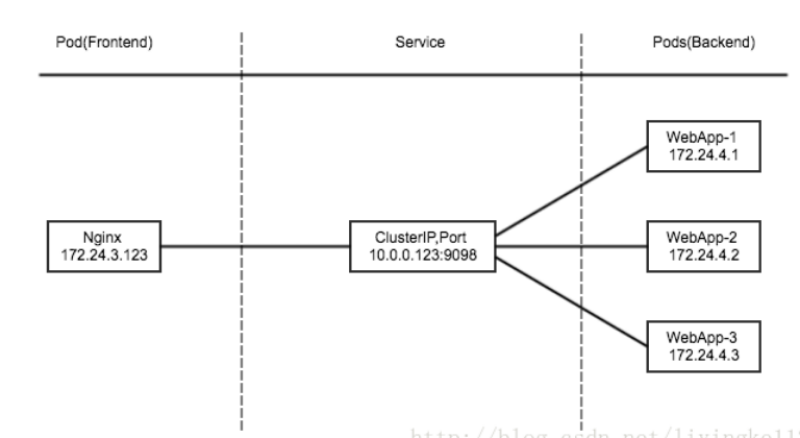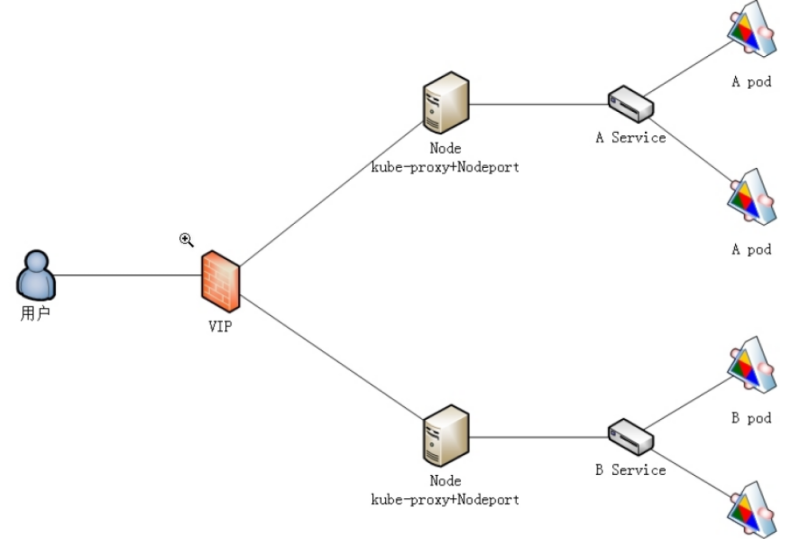163 lines
5.0 KiB
Markdown
163 lines
5.0 KiB
Markdown
<h1><center>Kubernetes资源对象service</center></h1>
|
||
|
||
著作:行癫 <盗版必究>
|
||
|
||
------
|
||
|
||
## 一:Service
|
||
|
||
将运行在一组 [Pods](https://v1-23.docs.kubernetes.io/docs/concepts/workloads/pods/pod-overview/) 上的应用程序公开为网络服务的抽象方法
|
||
|
||
使用 Kubernetes,你无需修改应用程序即可使用不熟悉的服务发现机制;Kubernetes 为 Pods 提供自己的 IP 地址,并为一组 Pod 提供相同的 DNS 名, 并且可以在它们之间进行负载均衡
|
||
|
||
Kubernetes Service 定义了这样一种抽象:逻辑上的一组 Pod,一种可以访问它们的策略 —— 通常称为微服务
|
||
|
||
举个例子,考虑一个图片处理后端,它运行了 3 个副本。这些副本是可互换的 —— 前端不需要关心它们调用了哪个后端副本。 然而组成这一组后端程序的 Pod 实际上可能会发生变化, 前端客户端不应该也没必要知道,而且也不需要跟踪这一组后端的状态
|
||
|
||
#### 1.定义 Service
|
||
|
||
例如,假定有一组 Pod,它们对外暴露了 9376 端口,同时还被打上 `app=MyApp` 标签:
|
||
|
||
```shell
|
||
apiVersion: v1
|
||
kind: Service
|
||
metadata:
|
||
name: my-service
|
||
spec:
|
||
selector:
|
||
app: MyApp
|
||
ports:
|
||
- protocol: TCP
|
||
port: 80
|
||
targetPort: 9376
|
||
```
|
||
|
||
上述配置创建一个名称为 "my-service" 的 Service 对象,它会将请求代理到使用 TCP 端口 9376,并且具有标签 `"app=MyApp"` 的 Pod 上
|
||
|
||
Kubernetes 为该服务分配一个 IP 地址(有时称为 "集群IP"),该 IP 地址由服务代理使用
|
||
|
||
注意:
|
||
|
||
Service 能够将一个接收 `port` 映射到任意的 `targetPort`。 默认情况下,`targetPort` 将被设置为与 `port` 字段相同的值
|
||
|
||
#### 2.多端口 Service
|
||
|
||
对于某些服务,你需要公开多个端口。 Kubernetes 允许你在 Service 对象上配置多个端口定义
|
||
|
||
```shell
|
||
apiVersion: v1
|
||
kind: Service
|
||
metadata:
|
||
name: my-service
|
||
spec:
|
||
selector:
|
||
app: MyApp
|
||
ports:
|
||
- name: http
|
||
protocol: TCP
|
||
port: 80
|
||
targetPort: 9376
|
||
- name: https
|
||
protocol: TCP
|
||
port: 443
|
||
targetPort: 9377
|
||
```
|
||
|
||
## 二:发布服务
|
||
|
||
#### 1.服务类型
|
||
|
||
对一些应用的某些部分(如前端),可能希望将其暴露给 Kubernetes 集群外部 的 IP 地址
|
||
|
||
Kubernetes `ServiceTypes` 允许指定你所需要的 Service 类型,默认是 `ClusterIP`
|
||
|
||
`Type` 的取值以及行为如下:
|
||
|
||
`ClusterIP`:通过集群的内部 IP 暴露服务,选择该值时服务只能够在集群内部访问。 这也是默认的 `ServiceType`
|
||
|
||

|
||
|
||
`NodePort`:通过每个节点上的 IP 和静态端口(`NodePort`)暴露服务。 `NodePort` 服务会路由到自动创建的 `ClusterIP` 服务。 通过请求 `<节点 IP>:<节点端口>`,你可以从集群的外部访问一个 `NodePort` 服务
|
||
|
||

|
||
|
||
[`LoadBalancer`](https://v1-23.docs.kubernetes.io/zh/docs/concepts/services-networking/service/#loadbalancer):使用云提供商的负载均衡器向外部暴露服务。 外部负载均衡器可以将流量路由到自动创建的 `NodePort` 服务和 `ClusterIP` 服务上
|
||
|
||
你也可以使用Ingress来暴露自己的服务。 Ingress 不是一种服务类型,但它充当集群的入口点。 它可以将路由规则整合到一个资源中,因为它可以在同一IP地址下公开多个服务
|
||
|
||
```shell
|
||
[root@master nginx]# kubectl expose deployment nginx-deployment --port=80 --type=LoadBalancer
|
||
```
|
||
|
||
#### 2.NodePort
|
||
|
||
如果你将 `type` 字段设置为 `NodePort`,则 Kubernetes 控制平面将在 `--service-node-port-range` 标志指定的范围内分配端口(默认值:30000-32767)
|
||
|
||
例如:
|
||
|
||
```shell
|
||
apiVersion: v1
|
||
kind: Service
|
||
metadata:
|
||
name: my-service
|
||
spec:
|
||
type: NodePort
|
||
selector:
|
||
app: MyApp
|
||
ports:
|
||
# 默认情况下,为了方便起见,`targetPort` 被设置为与 `port` 字段相同的值。
|
||
- port: 80
|
||
targetPort: 80
|
||
# 可选字段
|
||
# 默认情况下,为了方便起见,Kubernetes 控制平面会从某个范围内分配一个端口号(默认:30000-32767)
|
||
nodePort: 30007
|
||
```
|
||
|
||
#### 3.案例
|
||
|
||
```shell
|
||
apiVersion: apps/v1
|
||
kind: Deployment
|
||
metadata:
|
||
name: nginx-deployment
|
||
spec:
|
||
replicas: 3
|
||
selector:
|
||
matchLabels:
|
||
app: nginx
|
||
template:
|
||
metadata:
|
||
labels:
|
||
app: nginx
|
||
spec:
|
||
containers:
|
||
- name: nginx-server
|
||
image: nginx:1.16
|
||
ports:
|
||
- containerPort: 80
|
||
```
|
||
|
||
```shell
|
||
apiVersion: v1
|
||
kind: Service
|
||
metadata:
|
||
name: nginx-services
|
||
labels:
|
||
app: nginx
|
||
spec:
|
||
type: NodePort
|
||
ports:
|
||
- port: 88
|
||
targetPort: 80
|
||
nodePort: 30010
|
||
selector:
|
||
app: nginx
|
||
```
|
||
|
||
|
||
|
||
|
||
|
||
|
||
|